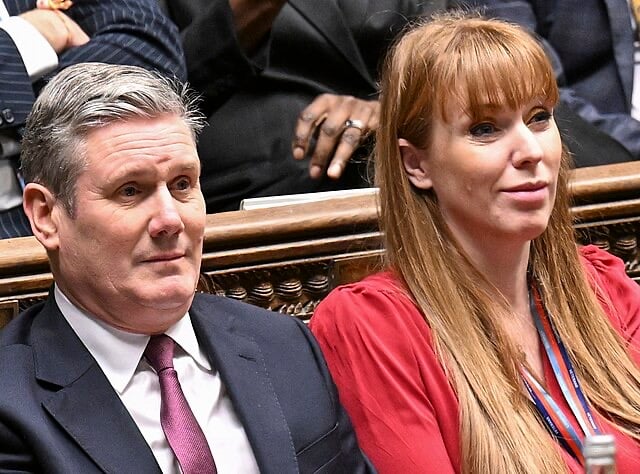In a scathing Prime Minister’s Questions (PMQs) clash this week, Labour leader Sir Keir Starmer tore into the Conservative Party, branding them “brain-dead” and accusing them of sliding into political irrelevance. His explosive remarks came as Reform UK continues to gain momentum across Britain, shaking up the traditional two-party dominance in the run-up to the next general election.
Starmer’s fiery rhetoric was directed at Conservative leader Kemi Badenoch, escalating tensions amid what many political analysts are calling the most volatile period in modern British politics.
Starmer vs Badenoch: A Political Powder Keg
The exchange began with Kemi Badenoch challenging Starmer with a question on unemployment forecasts:
“Can the Prime Minister promise the House that by this time next year unemployment will be lower than it is today?”
But Starmer, seizing the opportunity to land a political punch, turned the question into a blistering attack on Tory policy and leadership:
“You opposed every trade deal. You threatened to rip up our EU deal before even reading it. This once-great political party is reduced to brain rot… sliding into brain-dead oblivion.”
His comments were met with gasps and jeers across the Commons chamber but also underlined Labour’s strategy of going on the offensive as the Conservatives bleed support to the insurgent Reform UK.
Reform UK: The Rise of a Disruptor
Reform UK, led by right-wing firebrand Nigel Farage, has emerged as a serious threat to both Labour and the Tories. In recent local elections, the party secured a staggering 677 council seats and gained control of eight councils, many previously held by the Conservatives.
Polls now show that more voters view Reform UK as the main opposition party over the Conservatives, with 37% backing Reform as the real alternative to Labour, compared to just 33% for the Tories.
Farage has capitalized on public disillusionment with mainstream parties, campaigning hard on issues like immigration control, crime, and cost-of-living failures—messaging that has clearly struck a chord with voters across working-class and rural communities.
Labour’s Counterattack: Reclaiming Reform Hotspots
Faced with Reform UK’s surging popularity, Labour has unveiled an aggressive new strategy to win back voters in areas where the Tories and Reform have gained ground. This includes a commitment to invest hundreds of millions of poundsin “mission-critical” communities plagued by economic decline, health inequality, and poor educational outcomes.
The initiative will target over 600 towns and regions that have shifted toward Reform UK or sit on the political fence, signalling Labour’s intent to rebuild its red wall strongholds and reconnect with neglected working-class voters.
Starmer’s sharp rhetoric in Parliament is part of a broader campaign to discredit the Conservative Party while boxing in Reform UK as a party of protest rather than government.
The Tory Dilemma: Under Siege From All Sides
Kemi Badenoch and the Conservative frontbench are now under intense pressure to stabilize the party’s dwindling support base. The Tories face a two-pronged attack: bleeding moderate voters to Labour while losing disenchanted right-wing voters to Reform UK.
Insiders report rising panic within Tory ranks, with some MPs calling for a dramatic repositioning of policy to appease Reform-leaning voters—including tougher stances on immigration and crime, as well as a renewed focus on Brexit-related deregulation.
Without a clear recovery strategy, the Conservatives risk falling further behind, with Starmer and Farage carving up the political battlefield between them.
Conclusion
Sir Keir Starmer’s brutal takedown of the Conservative Party in PMQs was more than just political theater—it was a reflection of a changing electoral landscape. With Reform UK on the rise and the Tories on the back foot, British politics is entering uncharted territory.
As Labour ramps up its community investment pledges and Reform continues to ride a wave of anti-establishment anger, the Conservatives must either reinvent or risk irrelevance. The battle lines are drawn—and with a general election looming, the stakes have never been higher.
FAQs
Q1: Why did Keir Starmer call the Tories “brain-dead”?
A1: During PMQs, Starmer attacked the Conservatives for their opposition to trade deals and their stance on Labour’s EU agreement, accusing them of political incompetence and decline.
Q2: What is Reform UK and why is it surging?
A2: Reform UK is a right-wing party led by Nigel Farage, gaining traction with voters frustrated by traditional parties. It performed strongly in recent local elections.
Q3: How is Labour responding to Reform UK’s rise?
A3: Labour is investing in struggling communities and aggressively campaigning to win back support in areas where Reform is growing.
Q4: What is the Conservative Party doing to stop its decline?
A4: The party is under pressure to adopt tougher policies to appease Reform voters and stabilize its base, but it remains internally divided.
Q5: When is the next general election?
A5: While no official date is set, the next general election is expected in 2026 unless called earlier.



